S’pore opposition says 20 years away from government – Paper, Reuters, 31 Oct 2007
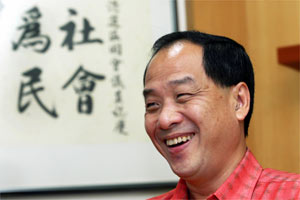 A Singapore opposition leader said it would take at least 20 years before his party can challenge the ruling party’s parliamentary dominance and serve as an alternate government, local media said on Wednesday.
A Singapore opposition leader said it would take at least 20 years before his party can challenge the ruling party’s parliamentary dominance and serve as an alternate government, local media said on Wednesday.
“I don’t think the Workers’ Party can challenge PAP’s standards in the near term. For us to become an alternate government is a faraway target … maybe in 20 years,” Workers’ Party leader Low Thia Khiang told Chinese newspaper Lianhe Zaobao in an interview.
At the last election in May 2006, the Workers’ Party won 16.3 percent of votes, giving Low one of two opposition seats in the 84-seat parliament. The PAP, which has been in power for four decades, won 82 seats with 66.6 percent of the votes cast.
Low said that, unlike opposition parties in Western countries, his party does not have enough resources to provide alternative solutions for every decision that the PAP makes.
He said the Workers’ Party lacks the kind of access to resources that the PAP has when drawing up policies and plans, such as the city state’s civil service and top-notch scholars.
Low said the Workers’ Party’s role is to suggest improvements to the policies made by the government.
&&&&&&&&&&&&&&&
Low Thia Khiang speaks of party’s goal at its 50th anniversary dinner held last night
THE Workers’ Party (WP) aims to achieve a breakthrough in Singapore politics by winning a GRC in the next General Election, said its leader Low Thia Khiang last night.
The task is ‘a must’, said the Hougang MP, if Singaporeans want its parliamentary democracy to function properly.
‘In my view, as long as the opposition is unable to secure a breakthrough in a GRC, the opposition remains a marginal player and at risk of extinction one day,’ he told about 700 people at a dinner to celebrate the WP’s 50th anniversary.
‘Any talk of checks and balances and alternative government would be just talk, let alone the dream of seeing an opposition party winning an election and taking over the government like in mature Western democracies.’
The dinner, held at the Fortunate Restaurant in Toa Payoh, was a lively occasion, with people seated at 67 tables.
Guests included the wife and son of the WP founder, the late Mr David Marshall – Jean, 81, and academic Jonathan, 38, – along with leaders of other opposition parties such as MrChiam See Tong of the Singapore Democratic Alliance and the National Solidarity Party’s Sebastian Teo.
Mr J.B. Jeyaretnam, the WP leader before Mr Low took over the helm in 2001, was absent.
Since the GRC was introduced in 1988 to ensure minority representation in Parliament, no opposition party has won such a group representation constituency, which has at least three seats.
Its introduction has divided elections into two leagues, said MrLow, who is the WP secretary-general.
The first league is the GRC and the second is the single member constituency (SMC) where no opposition candidate has unseated an incumbent since 1991.
He slammed the ruling People’s Action Party (PAP) for redrawing electoral boundaries to dissolve SMCs and create new ones.
Now, even single wards are hard to win for the opposition as the PAP fields office-holders such as ministers of state, or incumbent MPs with strong grassroots support, he observed.
‘If the situation continues, the opposition will be significantly weakened and its ability to contest elections to allow Singaporeans to exercise their political rights will be affected.’
He is, however, optimistic that there is a general aspiration among Singaporeans for the opposition to thrive.
This aspiration has not materialised because of the ruling party’s moves to limit political space and change election ground rules, among others, he said. But he acknowledged that it is also due to voters not having enough confidence in the opposition.
‘For those who feel that WP is not up to the mark, how about coming forward to do some public service? I challenge the critics of WP to join the Workers’ Party to make it better,’ he said.
Both Mr Low and party chairman Sylvia Lim paid tribute to veteran members – including former party chairman Tan Bin Seng and former organising secretary Ng Ah Chwee – who made ‘great sacrifices’ for the party.
Speaking to reporters at the dinner, Mr Chiam, the MP for Potong Pasir, welcomed Mr Low’s bid for a GRC win.
‘The fact that the opposition has not grown shows that the PAP has put obstacles in the way.
‘I believe we must win a GRC. If he wants to, he should get the strongest team,’ he said, adding that he would not rule out joining forces with Mr Low.
&&&&&&&&&&&&&&&
{FOI} – Interview with WP chief Low Thia Khiang, Peh Shing Huei, Straits Times, 3 Nov 2007
You gave the PAP a passing grade earlier this week. But you also mentioned that they can be more tolerant. In what areas would you like to see more tolerance?
They can be more tolerant towards political activities by political parties, such as when we wanted to apply to cycle at East Coast Park, the permit was not granted. I’m sure that isn’t going to threaten public security.
So I believe there is room where the Government can look into allowing more political space, to a have more open and consultative kind of environment, where they allow some activities like peaceful demonstrations in an area. Currently, they may allow you to do so at the Speakers’ Corner. But I’m sure we can afford to have more than one Speakers’ Corner here.
How is your party’s recruitment efforts? Do people reject you now because of fear?
No. People do come forward to join us. The challenge really is whether people who join us will remain and be actively involved in the party activities because I think everybody is hard- pressed for time. We are all volunteers.
We do have young people joining us. But I believe we don’t have a sufficient number yet to have the critical mass of manpower that we want.
You have said that you might one day contest in a GRC. How serious are you about that?
Well, my answer, as I have said before, is that I do not rule out the possibility that one day I might contest in a GRC. Many people are very interested to know when it would happen. My answer is you would know on Nomination Day.
But what is the likelihood of that happening?
Well, I don’t want to speculate because there is still some time before the next election.
Some wonder if you might be just like Mr Chiam See Tong and stay in Hougang like he is staying in Potong Pasir?
You will know when the time comes.
But wouldn’t your younger members very much love you to join them and contest a GRC?
Then perhaps you can ask my younger members whether they like me or they think I am lao-kok-kok (old and stuttering) already – ‘You join us, you may spoil the chance’.
But by keeping the option open that you may one day join them in a GRC, is that one way that you encourage them, to sustain their passion in WP?
Well, I think the passion has to be their own. And they must have the political passion to serve. They can’t depend on whether I would join them one day or not. That is hypothetical.
The PAP is only three years older than the WP. Why do you think the two parties are so different in what they’ve accomplished?
You cannot compare at all because one is a ruling party, monopolising the power and the resources since 1959. The Workers’ Party has been the opposition since 1959.
And you know what the PAP has done after becoming government. They have moved to capture the ground in terms of grassroots, in terms of regulation, restriction and all that, curtailing the development of the whole political process.
I think it is no mean feat that the Workers’ Party has survived until now. And you look at the other political parties at the point in time, where are they? What happened? Why? I think people must ask these questions.
Over the last few months, quite a few netizens online wonder why the Workers’ Party has been very quiet, especially in the wake of the CPF changes. What is your response?
First of all, the Workers’ Party is a responsible party and I do not believe in just making statements, just making comments for the sake of making noise, or of being labelled or afraid of being labelled inactive or quiet, in particular for the CPF issue.
When the PM spoke at the National Day Rally, not all details were out. It is imprudent for a responsible political party to start jumping up and down without even knowing what are the details, what is the concrete plan.
We have made an informed statement and we can properly represent the public and tell the public what is our stand. I know this is the Internet age but I think we can’t just respond because people want us to respond.
But what if that is precisely what some people want now – speed, fast, instant?
I don’t know, but I think, I’m a bit slow, I have to admit that. I have to admit that I am slow. And people who want it faster should perhaps consider joining the Workers’ Party.
I’m old, maybe slower. The younger ones will be faster, so we have more younger ones, perhaps maybe the Workers’ Party will move faster. So those people who think that we are slower, well, come and join the Workers’ Party to make it faster.
&&&&&&&&&&&&&&&&
{FOI} – 20 years for Workers’ Party to match PAP?
Sec-Gen Low wants WP to be respected and reliable first
TODAY, November 1, 2007
AS THE Workers’ Party celebrates this weekend its 50th anniversary, and Secretary-General Low Thia Kiang takes a measure of satisfaction with his party’s performance so far, he already has hopes for its 60th anniversary.
He hopes he will no longer be party chief by then.
It is a sign of the confidence he has in the prospects for the party, which was the best performer among the opposition parties at last year’s General Election.
Come WP’s 70th anniversary, he reckons it will be ready finally to match the quality of the People’s Action Party (PAP) and have a good go at forming Singapore’s government.
In a broad-ranging interview with Chinese-language newspaper Lianhe Zaobao, Mr Low — who became WP secretary-general in 2001 — gave the PAP a definite “passing” grade. And he said that there is more space in Singapore politics now.
But he noted that the ruling party had the backing of many scholars to help draw up policies, while the WP’s resources and ability to mobilise people are limited. So, what the WP can do currently is propose refinements to government policies.
One of Mr Low’s main grouses about current policies is that they have not engendered sufficiently, in his view, a sense of belonging in the country.
“For example, in the debate on CPF, some people say: Might as well take out CPF and migrate,” he said in describing the sense of insecurity caused by a higher withdrawal age.
“Identification with a country is a feeling; it means that no matter what, I was born here, so I die here. I think Singapore has not reached such a stage of emotional identification.”
At this point, though, his main preoccupation is to make the WP a respected and reliable party.
“Our main aim is to … garner more support from the constituents, and make a breakthrough in the elections, especially in the Group Representation Constituencies. At the same time, we hope that the WP can play an important role in Singapore’s democratic process, and as a result, make the democratic process more competitive,” he said. “Politics should be about responsible politics. The opposition should be a watchdog, not a mad dog. That’s the right path for a political party.”
As for succession in the WP, when asked by Zaobao if party chairman Sylvia Lim would take over the reins eventually, he said it was for all the WP members to decide. He did say, however, why he did not invite the PAP to his party’s anniversary.
“When we had our 40th anniversary celebration, we did invite them, but they replied to say ‘thank you for inviting but we cannot attend’. So, I thought, don’t make things difficult for other people. So, we didn’t send an invite this year,” he said.
&&&&&&&&&&&&&&&&
{FOI} – WP chief: 377A debate shows more openness, Straits Times website, 31 Oct 2007
WORKERS’ Party (WP) leader Low Thia Khiang sees the Government’s handling of the recent debate on the law against male homosexuality as a sign of greater openness here.
He cited the Section 377A debate as an example of a more relaxed political atmosphere, as he gave the ruling People’s Action Party (PAP) a passing grade in its governance
‘You don’t see very strong reactions from the Government towards criticisms and citizen initiatives,’ he told The Straits Times on Wednesday night.
‘The environment has changed compared to when I just joined politics in the early ’80s…people are more vocal and people are more comfortable to air their views in public. So I think it is an improvement.’
In a separate interview with Chinese-language daily Lianhe Zaobao ahead of the WP’s 50th anniversary celebrations on Saturday, he was asked how he would grade the PAP government. He said it was ‘definitely a pass’.
But at the same time, he criticised some of the Government’s policies, arguing that the recent Central Provident Fund (CPF) changes are unfair to the elderly.
He said that by delaying the draw-down age of the CPF Minimum Sum, the Government is essentially leaving older Singaporeans with no choice but to continue working.
While supporting the Government’s anti-terrorism moves, he expressed concern that they may increase the authorities’ power.
Still, the WP secretary-general – who said he hoped that he will not be the party leader when it celebrates its 60th anniversary – insists it is not right for a political party to oppose for the sake of opposing.
‘The term opposition is a legacy of the Western parliamentary system, and I have never believed that an opposition party should oppose for the sake of opposing or to shoot one’s mouth off.
‘Politics should be about responsible politics. The opposition should be a watchdog, not a mad dog. That should be the path for a political party.’
It is also not the job of the opposition here to offer alternatives to all government policies, he argued.
While the ruling party has specialists to study and research various issues, the opposition lacks the resources to come up with alternatives.
He pointed out that the WP is unlike the opposition parties in the West, which come up with alternative policies for everything.
The WP’s role is to revise and improve on government policies. Moreover, the opposition should not shoot its mouth off, and offer alternative policies on a whim.
‘A political party needs to reach a certain stage before it can offer alternative policies, that is, at a stage where it is capable of replacing that government. And WP still has a very long way to go before reaching this stage.’
In fact, he did not think his party is ready to challenge the PAP for government in the ‘near future’.
Said the 51-year-old: ‘To become ready to take over the government is a very long-term goal. Every political party wishes to be ready to form the government and eventually become the ruling party. But to me, this is still very far, we need to take one step at a time.’
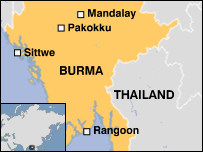 More than 100 monks in Pakokku Township in Magwe Division marched in a peaceful demonstration, starting about 8 am on Wednesday. The monks marched through the town’s streets chanting the “Metta Sutta” (the Buddha’s words on loving kindness). Many residents bowed before the protesting monks and the march ended peacefully about one hour later, sources said. Military authorities are now investigating which monasteries were involved in the march, said local residents. Pakokku was the site of the first violent crackdown on monks engaged in peaceful demonstrations in early September, which escalated into a nationwide anti-junta uprising in Rangoon and other cities.
More than 100 monks in Pakokku Township in Magwe Division marched in a peaceful demonstration, starting about 8 am on Wednesday. The monks marched through the town’s streets chanting the “Metta Sutta” (the Buddha’s words on loving kindness). Many residents bowed before the protesting monks and the march ended peacefully about one hour later, sources said. Military authorities are now investigating which monasteries were involved in the march, said local residents. Pakokku was the site of the first violent crackdown on monks engaged in peaceful demonstrations in early September, which escalated into a nationwide anti-junta uprising in Rangoon and other cities.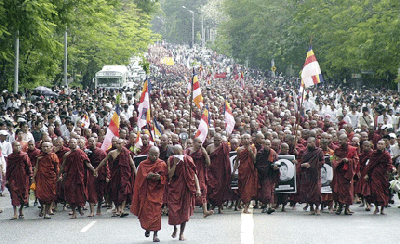
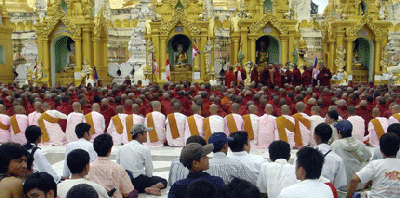
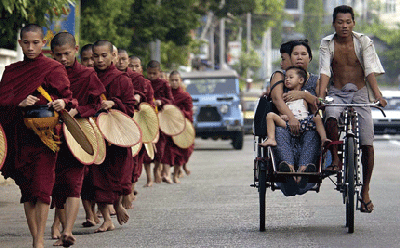
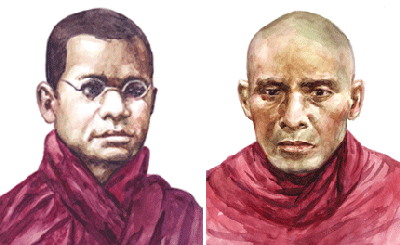
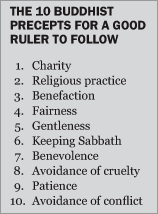 In August, 1988, days after the massacre in Rangoon, monks expressed sorrow for the loss of life, but—to the surprise of many—they also appealed to the regime to govern in accordance with the 10 duties prescribed for rulers of the people. The appeal failed to calm the public mood, but the message did remind many Burmese of the “10 duties of rulers”—the monks were telling Ne Win to be a good ruler.
In August, 1988, days after the massacre in Rangoon, monks expressed sorrow for the loss of life, but—to the surprise of many—they also appealed to the regime to govern in accordance with the 10 duties prescribed for rulers of the people. The appeal failed to calm the public mood, but the message did remind many Burmese of the “10 duties of rulers”—the monks were telling Ne Win to be a good ruler.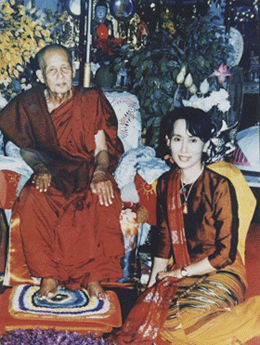 Soon after her release from her first term of house arrest in 1995, Suu Kyi immediately traveled to Karen State, followed by infuriated intelligence officers. She went there to make an offering to “Thamanya Sayadaw.”
Soon after her release from her first term of house arrest in 1995, Suu Kyi immediately traveled to Karen State, followed by infuriated intelligence officers. She went there to make an offering to “Thamanya Sayadaw.”





